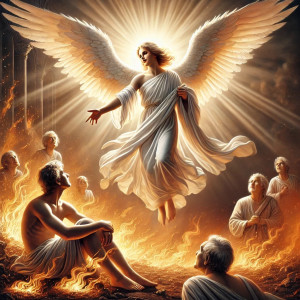Do Catholics believe in purgatory:
The Catholic belief in purgatory is a way of understanding God's care for souls who, at the time of death, are in His grace but still need purification to be fully ready to enter Heaven.
Purgatory is a truth of faith (dogma) officially proclaimed at the Council of Florence (1439) and reaffirmed at the Council of Trent (1545-1563), but it has been professed by the Catholic Church since its beginnings, confirmed by Tradition, Scripture, and the Church's Magisterium. In all forms of Eucharistic Prayers in Holy Masses, there is a moment of prayer for the deceased, where the church offers for souls the sacrifice of Christ.
It is important to remember that these prayers only have an effect on the souls in purgatory, as those who are in the glory of Heaven do not need prayers because they already contemplate God, and those who are in hell are already condemned. In any case, if someone, for example, prays for a soul that is already in Heaven, their prayers will benefit those who still need them.
In the Bible, we see several examples that point to this idea. One of them is in 2 Maccabees 12:38-46, where Judas Maccabeus commands prayers and sacrifices to be offered for the dead, believing that this could help them. This suggests that, even after death, souls can go through a process of purification, and the prayers of the living can be of great value to them.
Jesus also speaks of a type of purification in Matthew 5:26, saying: "You will not get out of there until you have paid the last penny." This leads us to think that, before being totally with God, there might be some kind of "account settlement," a time of purification.
In Matthew 12:32, Jesus mentions that some sins can be forgiven "in this world or in the world to come," suggesting that after death, there is still the possibility of purification for some souls.
Saint Paul also makes a reference to this in 1 Corinthians 3:11-15, when he says that each person's works will be tested by fire, and those whose works are not good will suffer loss, but they will still be saved "as through fire." This fire is understood as a necessary purification.
Another important point is in 1 Peter 1:6-7, which compares our faith to gold being purified in fire. This reinforces the idea that, even after death, we can go through a phase of refinement and purification before being ready for the fullness of Heaven.
Finally, Revelation 21:27 says that "nothing impure will enter Heaven," which reminds us that, to be in God's presence, we must be completely purified.
The Catechism of the Catholic Church explains that purgatory is that state of purification for souls who died in friendship with God but still need a final purification before entering Heaven (CIC 1030). And, as the Catechism teaches, the prayers of the living can help these souls to purify themselves more quickly (CIC 1032).
Therefore, purgatory is not a punishment, but a demonstration of God's love and mercy, offering a final opportunity for purification. It is a path of preparation so that all may reach full holiness and be with God eternally in Heaven.

What is Purgatory?
Purgatory is a state of purification for souls who, although in friendship with God, need to be purified to enter Heaven. As the Catechism teaches (§1030), it is an opportunity of grace and mercy from God, preparing souls for heavenly glory.

Biblical Foundations and Tradition of Purgatory
The Bible provides indications of purification after death, as in 2 Maccabees 12:38-46 and 1 Corinthians 3:11-15. Tradition and the Church's Magisterium reaffirm this belief, consolidated in the Councils of Florence and Trent.

Prayer for Souls: An Act of Charity
The Church teaches that prayers for the deceased help souls in purgatory to purify more quickly (CIC §1032). It is an act of Christian charity that benefits souls in their final journey towards God's presence.
-
Prayer for the dead suggests purification after death: 2 Maccabees 12:38-46
-
The need to "pay the last penny" before leaving: Matthew 5:26
-
Forgiveness of sins in the "world to come": Matthew 12:32
-
Salvation "through fire" after works are tested: 1 Corinthians 3:11-15
-
Prayer of the living for the dead, indicating the possibility of help: 1 Corinthians 15:29
-
Purification and atonement needed even after death: 1 Peter 1:6-7
-
"Nothing impure shall enter heaven," implying purification: Revelation 21:27
-
CIC 958, 1030, 1031, 1032, and 1472
-
AQUINO, Felipe. Purgatory: What the Church Teaches. 10th ed. Lorena: Cléofas Publishing, 2019.
While every effort is made to ensure accuracy and conformity with the teachings of the Catholic Church, we acknowledge that errors in interpretation or presentation may occur. If you identify any answer or content that is not in line with the official teachings of the Church, we kindly ask you to inform us. We are committed to reviewing and promptly correcting any errors that are identified.
We understand that fidelity to the Church’s doctrine is fundamental, and for this reason, we value users' collaboration in maintaining the integrity of the content presented.
We thank you for your understanding and commitment to the Catholic faith.







